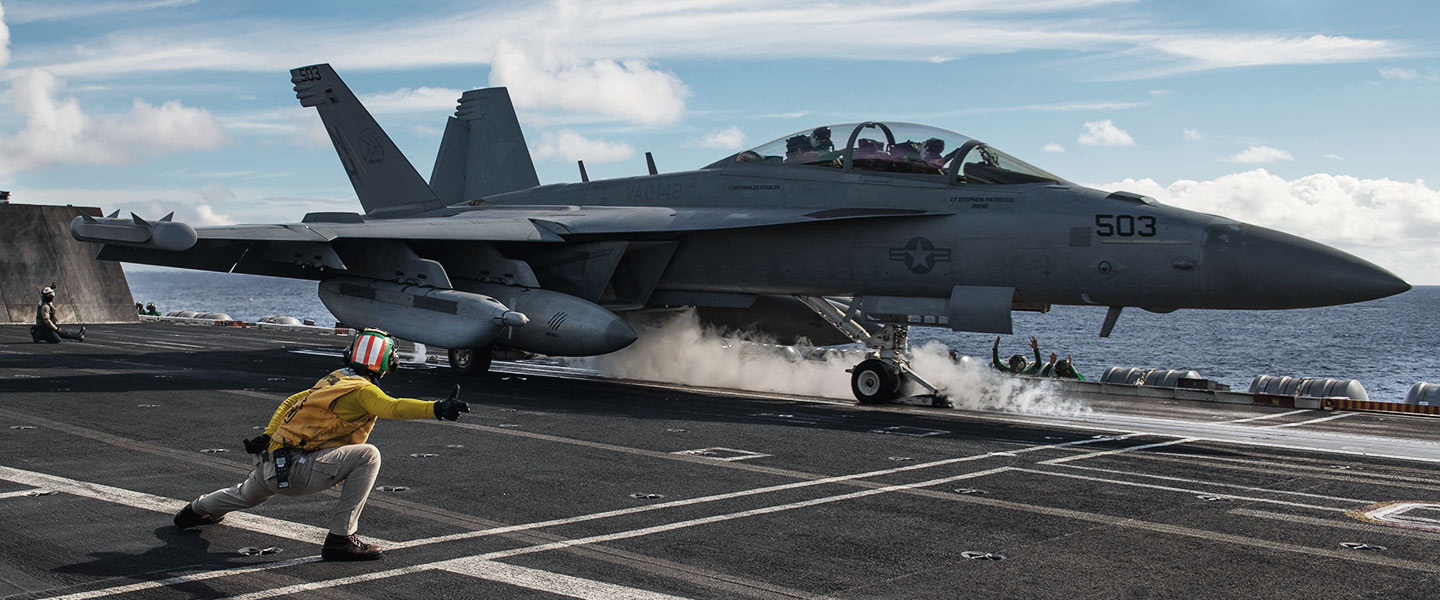What to Expect
More Information
Responsibilities
Catapult Officers direct and supervise the launching and recovery of embarked aircraft. Their responsibilities include:
- Ensuring readiness of launching equipment
- Establishing WOD (wind over deck) requirements
- Supervising catapult airplane spotter and catapult crew at prescribed launching stations
- Directing the firing of the catapult
- Ensuring readiness of arresting gear, barricade and visual landing aid systems
- Supervising the recovery of the aircraft
- Planning, scheduling, supervising and recording preventive maintenance and repairs of launch and recovery equipment
- Maintaining inventory and custody of ready service spare parts and accessories
Work Environment
As a Shooter, you’ll travel around the world for a variety of missions. You may be assigned to sea or shore squadrons on almost any continent. You will have the opportunity to work in every type of environment – from airborne aircraft to hangars, hangar decks to flight decks and flight lines at air stations and on aircraft carriers.
Training & Advancement
Those pursuing a Catapult Officer position are required to attend Officer Candidate School (OCS) in Newport, RI.
From there, candidates will complete a 6-week air indoctrination course at Naval Aviation Schools Command in Pensacola, FL. Finally, Catapult Officer candidates attend Aviation Maintenance School in Pensacola, FL, to learn leadership, logistics and operational support of the Naval Aviation Fleet.
Advanced technical training in the aviation field is also available as part of your career development, preparing you for any number of future civilian careers with airports, airline industries, government and law enforcement agencies, aircraft manufacturers and more.
Promotion opportunities are regularly available but competitive and based on performance.
Post-Service Opportunities
Specialized training received and work experience gained in the course of service can lead to valuable credentialing and occupational opportunities in related fields in the civilian sector.
Education Opportunities
Wherever you are in your professional career, the Navy can help ease your financial burdens and advance your career with generous financial assistance and continuing education programs. Opportunities for further education within this platform include:
Qualifications & Requirements
A degree from a four-year college or university is a minimum educational requirement to become a Commissioned Officer. You must also attend Officer Training. There may be exceptions to the degree requirements based on extensive service experience.
General qualifications may vary depending upon whether you’re currently serving, whether you’ve served before or whether you’ve never served before.
Part-Time Opportunities
There are part-time opportunities available as a Catapult Officer.
Serving part-time as a Navy Reserve Sailor, your duties will be carried out during your scheduled drilling and training periods. During monthly drilling, Catapult Officers in the Navy Reserve typically work at a location close to their homes.
For annual training, Catapult Officers may serve anywhere in the world, whether on a ship at sea or at bases and installations on shore.
Take a moment to learn more about the general roles and responsibilities of Navy Reserve Sailors.
Most of what you do in the Navy Reserve is considered training. The basic Navy Reserve commitment involves training a minimum of one weekend a month (referred to as drilling) and two weeks a year (referred to as Annual Training) – or the equivalent of that.
Catapult Officers in the Navy Reserve serve in an Officer role. Before receiving the ongoing professional training that comes with this job, initial training requirements must first be met.
For current or former Navy Officers (NAVET): Prior experience satisfies the initial leadership training requirement – so you will not need to go through Officer Training again.
Officers who previously held a commission in another United States Military Service, National Oceanic and Atmospheric Administration, Public Health Service, or United States Coast Guard are exempt from attending ODS or LDO/CWO Academy.

































































































































